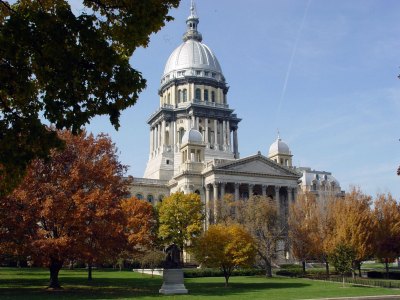Governor J.B. Pritzker and state Democrats are celebrating passage of legislation that designates funds to pay down the state’s deficit in the unemployment insurance trust fund. State Republicans say that the legislation will eventually lead to a tax on businesses and the elimination of a safety net to the state’s unemployed.
The legislation places $2.7 billion in the state’s unemployment insurance trust fund, which had become depleted due to the payout of benefits during the Covid-19 pandemic. Pritzker touted the move by the General Assembly saying it puts the state in better financial standing: “Today we mark yet another milestone in getting Illinois’ fiscal house in order — paying down $4.1 billion in debt for health insurance, college programs, pensions and unemployment. These actions are saving Illinois taxpayers hundreds of millions of dollars in interest payments and reducing the burden that would fall onto businesses and workers over the next decade. Democrats in the General Assembly are overcoming the difficult circumstances of our past and putting working families first.”
The legislation also pays $898 million in legacy debt for state employee health insurance, a $300 million payment to the state’s pension funds, and more than $200 million to pay off the College Illinois tuition contracts. According to the Pritzker Administration, the 1990s-era prepaid tuition program has been on the verge of insolvency for years and the payoff will allegedly save taxpayers $75 million in unnecessary costs over the remaining life of the program.
State Republicans’ opinions of the bill say it’s not going to save the state’s businesses or taxpayers in the long run, and will cause a tax hike. Republican State Senator Win Stoller of Peoria said in a press conference yesterday that the bill will have dire consequences: “We are facing the possibility of one of the largest tax increases on employers in Illinois history. We are facing the possibility of significant benefit cuts to people who need them most – unemployed workers. And, we are facing the possibility of trying to borrow our way out of this problem.”
GOP gubernatorial candidate Jesse Sullivan says it’s another tax increase by the Pritzker Administration: “J.B. Pritzker has never met a tax hike he doesn’t like. And his failure to pursue commonsense budgeting is now costing Illinois families and businesses millions of dollars. The governor could have fixed this problem more than a year ago by using federal aid money to replenish our unemployment insurance trust fund, as more than 30 states have done. Instead, he went on a corrupt spending spree, including $1 billion in capital projects controlled by Democrats. Taxpayers and small businesses deserve better.”
Aurora Mayor and current GOP gubernatorial candidate Richard Irvin’s campaign echoed similar criticisms: “After trying to pass the largest tax hike in our state’s history, the Tax-Hiker-In-Chief is trying once more to tax Illinois families and businesses out of this state. Thanks to his reckless disregard for shoring up the Unemployment Insurance Trust Fund, Illinois employers and workers will have to make up the difference, resulting in billions of dollars in tax increases and benefit cuts. Tonight’s vote is yet another example as to why voters don’t trust Pritzker and Springfield politicians to do anything right, and exactly why we must take our state back.”
Lawmakers are up against an April 1 deadline to allocate the federal relief dollars to the unemployment fund. If they don’t act by then, rules from the U.S. Treasury Department would prohibit Illinois from reducing the amount or length of unemployment benefits until 2025. All Republicans voted no on the measure on the bill in the House on Wednesday with Democrats once again going alone on Thursday night.
It’s widely believed among Springfield insiders that the State may once again enter the the bond market to raise a yet-to-be-agreed-to sum. And like it’s already done twice in the past two decades, Illinois may trade one interest rate for another, borrowing from private lenders to pay back what it borrowed from the feds.




